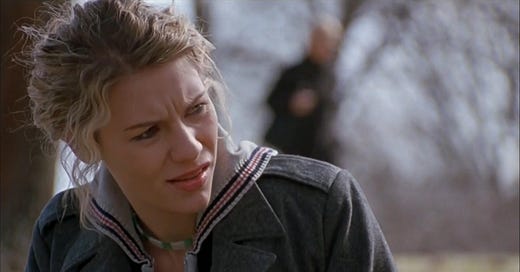That Time Claire Danes Made Me Want to "Dip into Rilke"
The ubiquity of Letters to a Young Poet amid the strange brilliance of 2002's Igby Goes Down
Youth Is Wasted on the Young
In “Can Rilke Change Your Life?” writer Kamran Javadizadeh delves into Rilke’s often-remarked-upon power to alter. Focusing on Letters to a Young Poet, the collection of Rilke’s well-known 1890s correspondence with Franz Xaver Kappus, Javadizadeh takes on the slim volume that’s perfect for tucking in a pocket or giving as a gift, which is precisely what has happened since the book’s first publication in 1929.
The epistolary form of the book is a core element of its endurance, as Javadizadeh sees it:
For Kafka, this doomed the project of immediacy—“How did people ever get the idea they could communicate by letter!”—but for Rilke and Kappus it was an essential feature of letter writing’s occult technology. “So much has to happen,” Rilke warned Kappus, in his second letter, “has to go right, a whole constellation of circumstances has to be in place, for anyone to actually advise, much less help, another person.” They were in many ways out of synch, misaligned. But, precisely because their letters produced so many ghostly selves, they made it possible for Rilke and Kappus to meet in a higher realm. The constellations we see in the night sky have, after all, been formed by light sent from vastly distant points in space and time.
Perhaps this is truly what has made Letters to a Young Poet so trenchant: not only its musings on the life of a poet but also its sense of misalignment, of trains crossing in the night.
Letters to a Young Poet is that most attractive of cultural documents because it digs into the poetic lifestyle and mindset without actually fretting about any of that pesky craft stuff in great detail. It’s all heart and guts, a document of one young artist who has figured out some things attempts to share what knowledge he has with another young artist who claims to have not figured out anything… yet.
The situation of Letters to a Young Poet makes it an apt choice for inclusion in a strange and brilliant star-studded film that centers on young people struggling to make sense of their lives: 2002’s Igby Goes Down.
Bohemian Like You
Igby Goes Down has a relatively small cast, but each and every main player is a household name: Kieran Culkin, Ryan Phillipe, Susan Sarandon (!), Bill Pullman, Jeff Goldblum, Amanda Peet, Jared Harris, and the aforementioned Claire Danes are all here and all giving it 100% in this film about 17-year-old Igby Slocumb (Culkin), whose strange and privileged background hampers him from genuinely knowing himself and identifying what kind of life he wants to live.
I have seen this film more times than I can count, and I can never quite decide if I long to be a part of its madness or if I’m glad to be far away from the fray. Does the world of this film really exist? Claire Danes’ perfect permed ponytail, Jared Harris’ eyeliner, Amanda Peet’s voluminous red coat in broad daylight on the Manhattan streets. The film is surreal and moneyed and morally bankrupt and delightful, with a deep, sad core that magnetizes you.
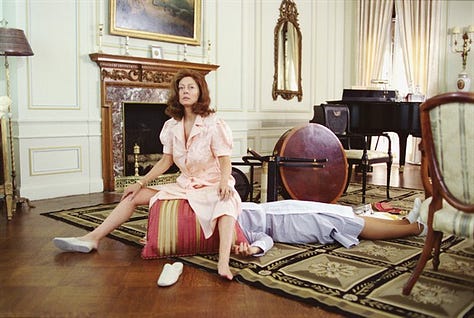
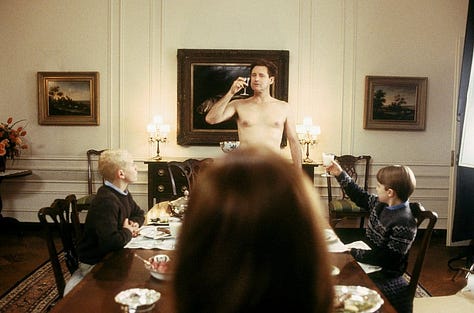
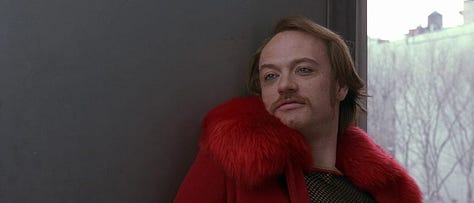
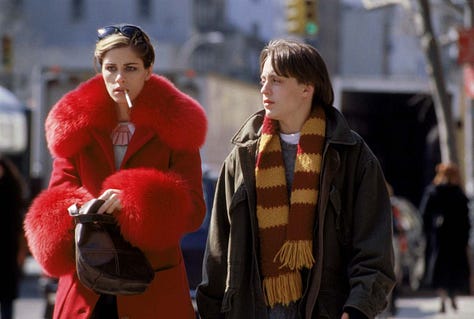


But a blend of privilege and restlessness and idealism ends up being the perfect cauldron over which Letters to a Young Poet could be incanted.
The Weight
In one scene, Danes’ Sookie Sapperstein (that name!) tries to counsel Igby and his WASP-y brother Ollie (Phillipe) about the younger brother’s problems (rich, hates his family, wants to run away from the series of increasingly draconian schools he’s being sent to). But she’s not just counseling, she’s also showing off:
OLLIE: Mom must have some photos of the head priest with an altar boy for them to even be considering Igby. We’re all at a bit of a loss as to—
SOOKIE: Whenever I’m at a loss, I uh… dip into Rilke.
IGBY: Rilke? That tortures me. Every Christmas, some asshole gives me this copy of Young Poet with this patronizing note on the flap about how it’s supposed to change my life.
OLLIE: Maybe you should read it before judging it.
IGBY: I’m pretty confident. After all, one of the copies was from you.
The idea that an early-aughts American teenager could not only be familiar with Rilke but also have registered a too-cool attitude about the Austrian poet is just too dreamy. What a world! But Igby is apparently immune to the wisdom contained in Letters to a Young Poet. Never read them? They sound like this:
If your everyday life appears to be unworthy subject matter, do not complain to life. Complain to yourself. Lament that you are not poet enough to call up its wealth. For the creative artist there is no poverty—nothing is insignificant or unimportant. Even if you were in a prison whose walls would shut out from your senses the sounds of the outer world, would you not then still have your childhood, this precious wealth, this treasure house of memories? Direct your attention to that. Attempt to resurrect these sunken sensations of a distant past. You will gain assuredness. Your aloneness will expand and will become your home, greeting you like the quiet dawn.
Though sometimes a little stilted to our ears and utterly brimming with privilege, the thesis here is still pretty good advice, Igby! And as for Sookie—her “pick-me” comment about “dipping into Rilke” is bait designed for Ollie, who ends up sleeping with her (much to Igby’s dismay, as he also ends up as her lover). And who wouldn’t want to dip into Rilke in times of difficulty, really? That phrase: dip in. How I wish I lived in a world where conversations like this happened regularly.
But we don’t get an actual Rilke in Igby Goes Down, which is a bummer. If writer Burr Steers had included a Rilke poem in the film, I kind of wish it would have been this one, a classic: “Archaic Torso of Apollo.” I think Igby would have been very into the urgency of its famous last line. Aren’t we all?
We cannot know his legendary head with eyes like ripening fruit. And yet his torso is still suffused with brilliance from inside, like a lamp, in which his gaze, now turned to low, gleams in all its power. Otherwise the curved breast could not dazzle you so, nor could a smile run through the placid hips and thighs to that dark center where procreation flared. Otherwise this stone would seem defaced beneath the translucent cascade of the shoulders and would not glisten like a wild beast's fur: would not, from all the borders of itself, burst like a star: for here there is no place that does not see you. You must change your life.

